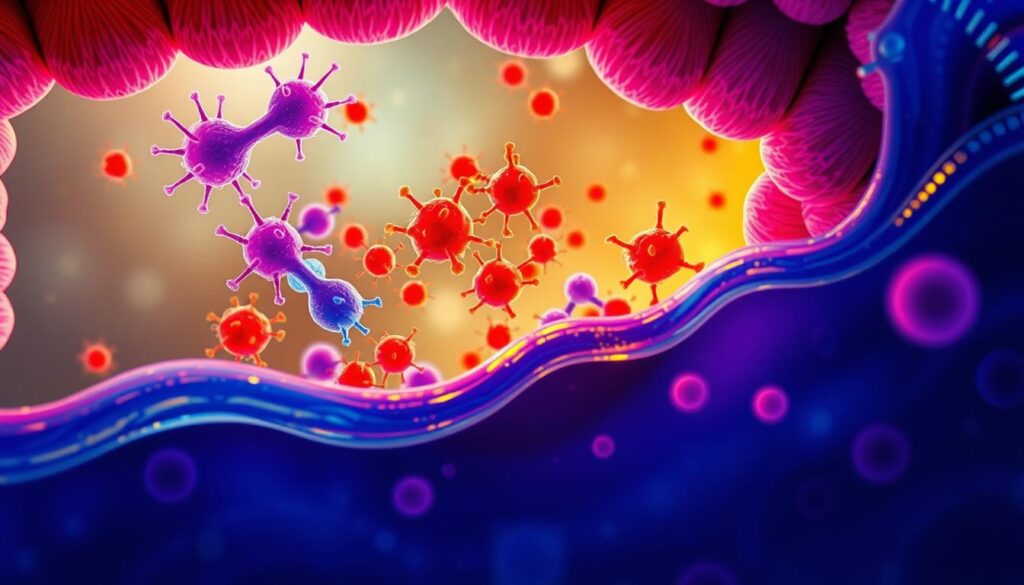Did you know diarrhoea affects up to 1.7 billion people worldwide each year? It’s one of the most common gastrointestinal disorders. Understanding its causes, symptoms, and how to manage it is key to staying healthy.
In this guide, we’ll explore diarrhoea in depth. We’ll look at its definition, how it affects the body, and what can cause it. Whether you’re dealing with sudden or ongoing diarrhoea, or it’s caused by infection or travel, we’ve got you covered.

Key Takeaways
- Diarrhoea is a prevalent gastrointestinal disorder that affects millions worldwide each year.
- Understanding the causes, symptoms, and risk factors of diarrhoea is crucial for effective management.
- Acute vs. chronic, infectious vs. non-infectious, and traveler’s diarrhoea are distinct types with varying characteristics.
- Dehydration and electrolyte imbalance are serious complications that require prompt attention.
- A combination of treatment options, home remedies, and preventive strategies can provide relief and support long-term digestive health.
Understanding Diarrhoea and Its Impact on Health
Diarrhoea is a common problem that affects the gut. It makes you have loose or watery stools often. This can really affect your health and how you feel.
What Defines Diarrhoea
Diarrhoea means having three or more loose stools a day. It happens when your gut can’t hold onto water. This can be due to many reasons, like food changes, infections, or health issues.
How Diarrhoea Affects the Body
Diarrhoea can change how your body works. It can make you lose important fluids and salts, like dehydration and electrolyte imbalance. This can cause abdominal cramping, tiredness, and feeling dizzy. Long-term diarrhoea can also stop your body from getting the nutrients it needs, leading to weight loss and nutritional problems.
Risk Factors and Susceptibility
Some people are more likely to get diarrhoea. This includes older adults, young children, and those with weak immune systems or gut problems. Age, health conditions, diet, and exposure to bad food or water can also play a role.
Knowing what diarrhoea is, how it affects the body, and who’s at risk is key. It helps in managing and preventing this common gut issue. By understanding its impact, you can take steps to deal with it and improve your health.
Common Causes of Loose Stools and Gastrointestinal Disorders
Diarrhea is when you have loose, watery stools. It can come from many things. Infectious diarrhea is often caused by bacteria or viruses. This can happen from food poisoning or contaminated foods and drinks.
Parasites like giardiasis or cryptosporidiosis can also cause diarrhea. These parasites can upset your stomach and lead to loose stools.
Some foods and medicines can also make your stools loose. If you can’t digest lactose or gluten, you might get diarrhea. Some drugs, like antibiotics or antidepressants, can mess with your gut and cause diarrhea too.
- Bacterial infections (e.g., Salmonella, Shigella, Escherichia coli)
- Viral infections (e.g., norovirus, rotavirus)
- Parasitic infections (e.g., giardiasis, cryptosporidiosis)
- Food intolerances (e.g., lactose intolerance, gluten sensitivity)
- Certain medications (e.g., antibiotics, laxatives, antidepressants)
Knowing why you have diarrhea is key to treating it. By finding out what’s causing it, you can take steps to feel better. This helps manage your stomach health and stops loose stools.

“Diarrhea is the body’s way of quickly clearing viruses, bacteria, or toxins from the digestive system.” – Mayo Clinic
Recognizing Different Types of Diarrhoea
Diarrhoea is a common issue in the gut. It can be divided into different types based on how long it lasts and what causes it. Knowing these types is key to getting the right treatment.
Acute vs. Chronic Diarrhoea
Acute diarrhoea starts suddenly and lasts less than 14 days. It’s often due to viruses, bacteria, or parasites. Chronic diarrhoea, however, lasts more than 4 weeks. It might be due to diseases like Crohn’s or malabsorption.
Infectious vs. Non-infectious Causes
Diarrhoea can also be split into infectious and non-infectious types. Infectious diarrhoea comes from germs in food or water. Non-infectious diarrhoea is linked to health issues, medicines, or what we eat.
Traveler’s Diarrhea Specifics
Traveler’s diarrhea is a common issue for those traveling to places with bad sanitation. It’s caused by eating or drinking contaminated things. To avoid it, stay clean and choose safe food and water.
Knowing about the different diarrhoea types helps us recognize symptoms. This way, we can get the right treatment or use home remedies to feel better.
Key Warning Signs and Symptoms
Diarrhoea is a common issue that can cause many uncomfortable symptoms. It’s important to know the warning signs to decide when to see a doctor. The main symptoms of diarrhoea are:
- Frequent, watery bowel movements
- Abdominal cramping and pain
- Bloating and gas
- Nausea and vomiting
- Fever and chills
- Urgent need to have a bowel movement
In serious cases, diarrhoea can cause dehydration and other health problems. Look out for signs of severe dehydration like too much thirst, feeling dizzy, and being very tired. If you have ongoing diarrhoea, fever, blood in your stool, or dehydration, see a doctor right away.
| Symptom | Description |
|---|---|
| Frequent, watery bowel movements | Three or more loose, watery stools per day |
| Abdominal cramping | Painful contractions in the abdomen |
| Dehydration | Excessive thirst, dizziness, fatigue |
| Fever and chills | Elevated body temperature, shivering |
Knowing the signs and symptoms of diarrhoea helps you manage it better. It also lets you know when to get medical help.

Dehydration and Electrolyte Imbalance: Understanding the Risks
Diarrhoea can lead to dehydration and electrolyte imbalances if not treated. These can be dangerous and even life-threatening. It’s important to know the signs of severe dehydration and how to manage electrolyte levels to recover quickly.
Signs of Severe Dehydration
Severe dehydration shows in many ways, like extreme thirst and dizziness. Fatigue and dark, concentrated urine are also signs. In kids, look for a sunken fontanel, dry mouth, and fewer tears.
If dehydration isn’t treated, it can cause organ failure and shock. This is a medical emergency that needs immediate help.
Managing Electrolyte Levels
Electrolytes like sodium, potassium, and chloride are key for fluid balance and body functions. Diarrhoea can quickly lower these levels, causing muscle cramps and heart issues. Oral Rehydration Solutions (ORS) are recommended to fix these imbalances.
When to Seek Medical Help
For mild diarrhoea, home care is usually enough. But, see a doctor if symptoms last more than two days or if dehydration signs are severe. Infants, young children, and older adults need quick medical help to avoid serious problems.
“Preventing and treating dehydration is essential for a full recovery from diarrhoea. Monitoring electrolyte levels and seeking medical care when necessary can make all the difference.”
Effective Treatment Options and Home Remedies
Diarrhoea can be managed with medical treatments and home remedies. Healthcare providers may suggest over-the-counter or prescription drugs. They also recommend specific treatments based on the cause.
Keeping hydrated is key in treating diarrhoea. Oral rehydration solutions (ORS) are often the first choice. They replace lost fluids and electrolytes. You can make ORS at home with water, salt, and sugar.
- Probiotics: They help balance gut bacteria, which can ease diarrhoea symptoms.
- Dietary changes: Eating a bland diet, like the BRAT diet, can soothe the stomach and offer quick relief.
- Herbal remedies: Ginger, chamomile, and peppermint have been used for centuries to manage diarrhoea.
For persistent or severe diarrhoea, doctors might prescribe antidiarrhoeal agents or antibiotics. It’s important to follow a doctor’s advice for proper treatment.
“Proper hydration and electrolyte balance are critical in the treatment of diarrhoea, as they help prevent dehydration and restore overall health.”
Combining conventional treatments with home remedies can help manage diarrhoea. This approach can reduce its impact on daily life.
Prevention Strategies and Dietary Modifications
Keeping food safe and practicing good hygiene are key to avoiding food poisoning and infectious diarrhea. Simple steps can greatly lower your risk of stomach problems.
Food Safety Guidelines
- Thoroughly cook all foods, especially meats, poultry, and seafood, to the recommended safe internal temperatures.
- Refrigerate perishable foods promptly and keep cold food cold.
- Wash your hands, utensils, and surfaces frequently when preparing food.
- Avoid cross-contamination by separating raw and cooked foods.
- Discard any expired or spoiled food items.
Recommended Dietary Changes
When you have diarrhea, changing your diet can help your digestive system recover. Here are some tips:
- Try a BRAT diet (Bananas, Rice, Applesauce, Toast) to firm up your stools.
- Eat more foods high in soluble fiber, like oatmeal, barley, and psyllium husk.
- Drink lots of water and electrolyte-rich drinks or diluted juices to stay hydrated.
- Avoid dairy, fatty, spicy, or high-fiber foods that can make symptoms worse.
Hygiene Practices
Good hygiene is key to stopping the spread of infectious diarrhea. Here’s what to do:
- Wash your hands well with soap and water, especially after using the bathroom and before cooking.
- Disinfect surfaces and clean bathrooms often to get rid of germs.
- Don’t share personal items like towels or utensils with people who have diarrhea.
- Keep yourself and your surroundings clean to lower the risk of getting sick.
By following these steps and making the right diet changes, you can lower your chance of food poisoning and infectious diarrhea. This helps keep your digestive system healthy.
Special Considerations for High-Risk Groups
Diarrhoea can be more dangerous for certain groups. It’s important to know their specific needs and how to manage their care. This helps prevent serious problems.
Young Children
Infants and toddlers are very sensitive to chronic diarrhea and dehydration. They can lose fluids and salts quickly, which is very dangerous. It’s crucial to get them medical help fast, rehydrate them properly, and watch them closely.
Older Adults
The elderly often have weaker immune systems. They are more likely to get very sick from diarrhoea. It’s important to watch for dehydration signs and make sure they drink enough water.
Pregnant Women
Diarrhoea can be risky for pregnant women and their babies. It’s important to keep fluids and nutrients balanced. Pregnant women should talk to their doctors about how to manage diarrhoea safely.
Immunocompromised Individuals
People with weakened immune systems, like those with HIV/AIDS or cancer, are at higher risk. They need quick medical help and careful monitoring to avoid long-lasting diarrhoea.
| High-Risk Group | Specific Considerations | Management Strategies |
|---|---|---|
| Young Children | Rapid fluid and electrolyte loss, risk of life-threatening complications | Prompt medical attention, proper rehydration, close monitoring |
| Older Adults | Weakened immune systems, diminished thirst response, increased risk of dehydration | Vigilant monitoring for signs of dehydration, ensuring adequate hydration |
| Pregnant Women | Risks to mother and developing fetus, complications like preterm labor and fetal growth restriction | Maintaining proper fluid and nutrient balance, consulting healthcare providers |
| Immunocompromised Individuals | Higher risk of severe, prolonged, or recurrent diarrhoea | Prompt medical intervention, close monitoring |
Healthcare professionals can help high-risk groups by understanding their unique challenges. Tailoring care can prevent and reduce the effects of chronic diarrhea and dehydration.
Conclusion
This article has covered a lot about diarrhoea. We talked about what it is, why it happens, and how to deal with it. Now, you know more about this common problem.
We looked at how diarrhoea affects the body and the different types. We also talked about how to prevent it. This information helps keep your digestive system healthy.
It’s important to know when to see a doctor. This article stressed the need for quick action, especially for those at high risk. By making smart food choices and staying clean, you can reduce your chances of getting diarrhoea.
Understanding diarrhoea is key to managing it. By knowing the causes and signs, you can take the right steps. This article aims to help you keep your gut healthy and feel better overall.
FAQ
Q: What is diarrhoea and how does it affect the body?
A: Diarrhoea is a common issue where you have loose or watery stools often. It can cause dehydration and upset your body’s balance of salts and water. This happens when your intestines can’t absorb water well, leading to more fluid in your stool.
Q: What are the main risk factors and causes of diarrhoea?
A: Many things can cause diarrhoea, like germs and food allergies. Some people, like young kids and the elderly, are more likely to get it. This is because their bodies are more vulnerable.
Q: How can I differentiate between acute and chronic diarrhoea?
A: Acute diarrhoea starts suddenly and usually goes away in less than two weeks. Chronic diarrhoea lasts longer, over four weeks. The causes and treatments for these two types are different.
Q: What are the signs and symptoms of severe dehydration and electrolyte imbalance?
A: Severe dehydration makes you very thirsty and tired. You might also feel dizzy and have less urine. Electrolyte imbalances can cause muscle cramps and heart problems. If you see these signs, get medical help fast.
Q: What are the most effective treatment options for diarrhoea?
A: The best way to treat diarrhoea is to replace lost fluids and salts. You can use special drinks or get fluids through an IV if needed. Some medicines can also help. For serious cases, your doctor might prescribe stronger treatments.
Q: How can I prevent diarrhoea and maintain good gastrointestinal health?
A: Keeping clean and handling food safely can stop diarrhoea from spreading. Eating right and staying hydrated helps your gut too. If you’re at high risk, like older adults, your doctor might suggest extra steps like vaccines or special medicines.
